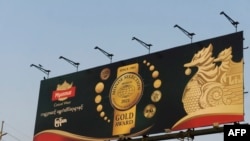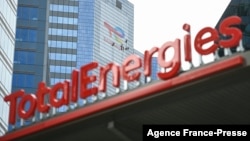Japanese drinks giant Kirin said Monday it would withdraw from Myanmar, after a failed bid to disentangle its operations from a joint venture with a junta-owned company after last year's coup.
With international pressure building against the military since it ousted and detained civilian leader Aung San Suu Kyi and waged a widespread crackdown on dissent, the brewery becomes the latest foreign company to pull out of Myanmar.
Kirin said its decision came after months of wrangling following last February's coup, which prompted the company to express concerns about human rights and eventually seek to end its joint venture Myanmar Brewery Limited.
It had decided "to withdraw from the business in Myanmar in order to urgently terminate its joint venture partnership" with military-linked MEHPCL, the company said in a statement.
Myanmar Brewery, whose beverages include its flagship and ubiquitous Myanmar Beer brand, boasted a market share of nearly 80 percent, according to figures published by Kirin in 2018.
Kirin's attempts to terminate the partnership with MEHPCL were unsuccessful, and the Japanese drinks maker said in November it would contest a bid to dissolve their joint brewery over fears liquidation proceedings would not be fair.
On Monday, Kirin said it had taken "every measure to find a way forward that would allow it to continue to contribute to Myanmar's economy and society."
That included filing for arbitration in Singapore in a bid to end the joint venture and proceed without the military-linked partner.
"In the end, Kirin Holdings determined that it would be difficult to quickly terminate the joint venture in the manner it desires," the company added.
"Therefore, Kirin Holdings has now commenced and is proceeding with discussions with MEHPCL in order to withdraw from the business in Myanmar, giving top priority to the termination of the joint venture as soon as possible."
A junta spokesperson did not immediately respond to a request for comment.
Firms withdrawing
With the economy tanking and pressure mounting from rights groups, companies from France's TotalEnergies to British American Tobacco and Norway's Telenor have upped sticks or announced they will leave Myanmar.
After the coup and arrest of the country's democratically elected leaders, Kirin said it was "deeply concerned" by the military's actions.
The brewery had been under pressure even before the coup over its ties to Myanmar's military, and launched an investigation after pressure from rights groups over whether money from its joint venture had funded rights abuses.
In a statement, Justice For Myanmar spokesperson Yadanar Maung welcomed Kirin's decision to withdraw from the country, praising the firm for "listening to the voice of Myanmar people and Myanmar, Japanese and global civil society."
"Kirin should never have entered into business with a brutal and corrupt military conglomerate," she added, accusing the brewery of having "financed atrocity crimes and enriched top generals."
The activist group urged other Japanese firms doing business with the military to cut ties, and called on Kirin to avoid payments to MEHPCL or the military during the withdrawal process.
Investors piled into Myanmar after the military relaxed its iron grip in 2011, paving the way for democratic reforms and economic liberalization in the country of more than 50 million people.
They poured money into telecoms, infrastructure, manufacturing and construction projects, but the coup upended the democratic interlude and damaged the economy.
The pandemic and supply chain disruptions have also hit the country, with Kirin saying in its earnings report released Monday that Myanmar's beer market had shrunk by about 20%.
It said Myanmar Brewery's sales volumes had decreased by around 30 percent compared with the same period last year.
Japan's government is a major provider of economic assistance to Myanmar, and Tokyo has long-standing relations with the country's military.
After the coup it announced it would halt all new aid, though it stopped short of imposing individual sanctions on military and police commanders, as some other nations have.
Tokyo has repeatedly called for Suu Kyi's release and the restoration of democracy, and last year the country's foreign minister said dialogue with the junta was ongoing but warned all foreign aid could be halted if rights violations continued.

